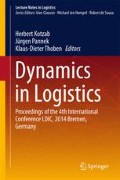Abstract
In this paper, we develop a model for the economic travel speed of container ships and show how the travel speed impacts the profit situation as well as the environmental sustainability. Thereby, we differentiate between a cost-optimal and profit-optimal travel speed strategy and show, based on model calculations, how both strategies lead to lower costs as well as lower emissions. Following the dynamic network aspect, we suggest that large container ship companies can adopt both strategies under specific market conditions which allow them to act profitable as well as environmental sustainable.
Access this chapter
Tax calculation will be finalised at checkout
Purchases are for personal use only
References
Bond P (2008) Improving fuel efficiency through supply chain? And the ship management plan. http://www.intermanager.org/2008/11/improving-fuel-efficiency-through-the-supply-chain/
Cariou P (2011) Is slow steaming a sustainable means of reducing CO2 emissions from container shipping? Transp Res 16D:260–264
Corbett JJ, Wang H, Winebrake JJ (2009) The effectiveness of speed reductions on emissions from international shipping. Transp Res 14D:593–598
Eyring V, Isaksen ISA, Berntsen T, Collins W, Corbett JJ, Endresen O, Grainger RG, Moldanova J, Schlager H, Stevenson DS (2010) Transport impacts on atmosphere and climate: shipping. Atmos Environ 44:4735–4771
Faber J, Freund M, Köpke M, Nelissen D (2010) Going slow to reduce emissions. Can the current surpluse of maritime transport capacity be turned into an opportunity to reduce GHG Emissions? Seas at Risk http://www.seas-at-risk.org/pdfs/speed%20study_Final%20version_SS.pdf
Gudehus T (2010) Optimale Geschwindigkeiten von Frachtschiffen, Forschungsbericht. Hamburg (Optimal freight ship speeds. A research report)
Gudehus T, Kotzab H (2012) Comprehensive logistics, 2nd revised and enlarged edn. Springer, Heidelberg
HSH Nordbank (2009) Betriebskostenstudie 2009. Untersuchung der Betriebskosten deutscher Containerschiffe—Kurzfassung (Study on operation costs 2009. Examining the operation costs of German container ships—Short version). Hamburg
Meyer J (2011) Slow steaming in der Contanerschifffahrt. TU Hamburg-Harburg
Münchmeier Petersen Capital (2003) Informationsbroschüre über die Beteilgungsgesellschaft Santa P Schiffe mit 6 Panamax-Containershiffen (Information leaflet for venture capital company Santa P ships with 6 Panamax-Containerships)
Notteboom T, Vernimmen B (2008) The effect of high fuel cost on liner service configuration in container shipping. J Transp Geogr 17:325–337
Psaraftis H, Kontovas C (2010) Balancing the economic and environmental performance of maritime transport. Transp Res 15D:458–462
Ronen D (1982) The effect of oil price on the optimal speed of ships. J Oper Res Soc 33:1034–1040
Schneekuth H, Bertram K (1998) Ship design for efficiency and economy, 2nd edn. Butterworth-Heinemann, London
Song D-P, Xu J (2012) An operational activity-based method to estimate emissions from container shipping considering empty container repositing. Transp Res 17D:91–96
Author information
Authors and Affiliations
Corresponding author
Editor information
Editors and Affiliations
Rights and permissions
Copyright information
© 2016 Springer International Publishing Switzerland
About this paper
Cite this paper
Gudehus, T., Kotzab, H. (2016). Economic Ship Travel Speed and Consequences for Operating Strategies of Container Shipping Companies. In: Kotzab, H., Pannek, J., Thoben, KD. (eds) Dynamics in Logistics. Lecture Notes in Logistics. Springer, Cham. https://doi.org/10.1007/978-3-319-23512-7_40
Download citation
DOI: https://doi.org/10.1007/978-3-319-23512-7_40
Published:
Publisher Name: Springer, Cham
Print ISBN: 978-3-319-23511-0
Online ISBN: 978-3-319-23512-7
eBook Packages: EngineeringEngineering (R0)

